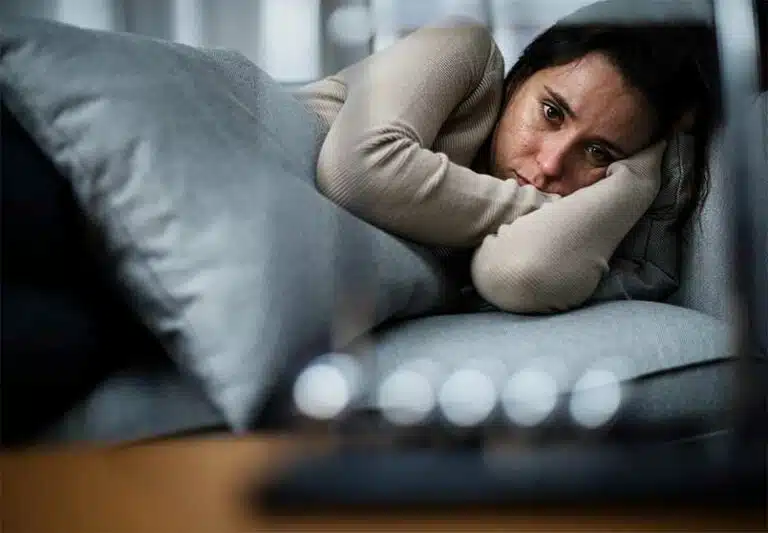What Is Depression? | Types, Causes, Symptoms, & Treatment
- Types Of Depression
- Causes Of Depression
- Symptoms Of Depression
- Treatment Options For Different Types Of Depression

Depression is a mental disorder defined by a loss of interest in daily activities, a lack of energy, persistent feelings of sadness or emptiness, problems with sleeping or eating, and other symptoms.
In severe cases, people with depression may resort to substance use or have suicidal thoughts.
Depression can affect your day-to-day functioning and relationships with others. According to the Substance Abuse and Mental Health Services Administration (SAMHSA), more than 20 million Americans experience depression every year.
Mental health treatment programs offer effective treatment plans for depression. Reaching out to a mental health professional near you can help you manage, live with, and improve your depressive symptoms.
Types Of Depression
The different types of depression are separated by the root causes of depression and how often the symptoms occur. The Diagnostic and Statistical Manual of Mental Disorders (DSM-5) recognizes the following types of depression:
- major depressive disorder
- seasonal affective disorder
- persistent depressive disorder
- perinatal depression
- psychotic depression
Other mental disorders, such as bipolar disorder, can also cause depressive symptoms. However, these are not defined as forms of depression.
Causes Of Depression
Many different risk factors can increase your risk of depression. The neurotransmitter serotonin regulates your mood, focus, and emotional stability. Low amounts of serotonin in your brain is linked to depression.
If you have a family history of depression, you may have a higher risk of depression. Life events such as stress, trauma, or chronic illnesses can also lead to depression.
Depressive symptoms can also be a side effect of some forms of birth control, medication for high blood pressure, acne medications, and other drugs.
Symptoms Of Depression
Different forms of depression cause different symptoms. Many forms of depression may also share symptoms with major depression.
Symptoms Of Major Depressive Disorder
Major depressive disorder, also known as major depression or clinical depression, is defined by a consistent depressed mood. Symptoms of major depression you can see in yourself, a loved one, or a family member may include:
- loss of interest in your daily activities
- feelings of worthlessness
- difficulty making decisions
- sleeping problems
- trouble concentrating
- sluggish movement
- suicidal thoughts
Severe depression can include these symptoms to an extreme degree. People with major depression may not feel relief from their symptoms for weeks, months, or years.
Symptoms Of Seasonal Affective Disorder
Seasonal affective disorder has similar symptoms to major depression. However, your depression may worsen during the fall and winter and improve during the spring and summer. The amount of sunlight present can also affect your symptoms.
Symptoms Of Persistent Depressive Disorder
Persistent depressive disorder, also called dysthymia, causes less severe depressive symptoms for long periods of time. People with dysthymia can have energy, sleeping, and mood problems but still be able to function in their daily lives.
Depressive episodes last for more than one year in patients with dysthymia.
Symptoms Of Perinatal Depression
Perinatal depression is defined as depressive symptoms caused by pregnancy. Postpartum depression, a common form of perinatal depression, starts shortly after childbirth. Unique symptoms of perinatal depression may include:
- problems caring for the newborn child
- problems bonding with the newborn child
- sudden weight loss or weight gain
- chronic pain
Symptoms Of Psychotic Depression
Psychotic depression includes hallucinations and delusions along with symptoms of depression. Forms of psychosis that can happen alongside depression may include:
- auditory hallucinations (hearing voices or sounds that are not there)
- visual hallucinations (seeing objects or people that are not there)
- delusions (strong but false beliefs)
- paranoia (extreme distrust or fear of others)
Treatment Options For Different Types Of Depression
Effective treatment options are available due to the high prevalence of depression in the United States. You can talk to your doctor or mental health treatment provider if you want to learn more about available treatment options.
Psychotherapy
Psychotherapy, also known as talk therapy, can help you understand and change your thoughts and actions. You work closely with a mental health professional to avoid falling into the cycle of depressive symptoms in the long term.
Forms of psychotherapy for depression include cognitive behavioral therapy (CBT), dialectical behavioral therapy (DBT), and interpersonal therapy.
Antidepressant Medication
Selective serotonin reuptake inhibitors (SSRIs) is a common treatment for depression. Low serotonin can be one cause of depression, and increasing your serotonin levels may help with your symptoms.
Other antidepressant medications include tricyclic antidepressants and selective norepinephrine reuptake inhibitors (SNRIs). Which medication is right for you depends on your specific needs.
Taking antidepressant medication as directed by your healthcare provider can help you improve your symptoms and help you avoid additional health problems.
Other Treatment Options
Other treatment options for depression include attending support groups, enrolling in wellness programs, and focusing on self-care.
Some treatment options can treat specific types of depression. Light therapy can give you a healthy amount of light exposure to fight seasonal affective disorder. Antipsychotic medications can reduce hallucinations and delusions, which can happen during psychotic depression.
If you, a loved one, or a family member are struggling with depression, help is available. Contact us today for a personalized mental health treatment plan that listens to your individual needs.
Written by Ark Behavioral Health Editorial Team
©2024 Ark National Holdings, LLC. | All Rights Reserved.
This page does not provide medical advice.
American Psychiatric Association - What Is Depression?
National Institute of Mental Health - Depression
Substance Abuse and Mental Health Services Administration - Depression
Questions About Treatment?
Ark Behavioral Health offers 100% confidential substance abuse assessment and treatment placement tailored to your individual needs. Achieve long-term recovery.
100% confidential. We respect your privacy.
Prefer Texting?
Our friendly support team is here to chat 24/7. Opt out any time.







 Learn More
Learn More








